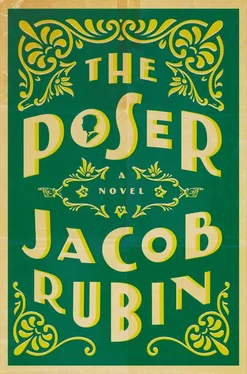There passed between us a silence to confirm our greeter had been wearing a bridal gown. Max motioned for Mama to pass and then followed her through the open door. Lucy pulled me aside. “Let’s find a bathroom and fuck. ”
“Lucy, I don’t think it’s—”
She grabbed my arm.
With alacrity, with a smirking sense of conspiracy, she separated us from Mama and Max. Down a hallway lined with caterers; through a sitting room where a string quartet played, the musicians — we saw as we passed through — wearing wolf masks; up the staircase, along which a series of black-and-white photographs showed in a flip-book sequence a black woman pushing out the corona of her newborn, who, at the top of the stairs, proved to be Caucasian; past a pear-shaped man in a silk waistcoat bounding after an escaped gerbil; past a woman with a hat made of plastic fruit kissing a woman with the same succulent hat. Around another hall Lucy led me to an unoccupied bathroom where we — as she ordered — fucked.
After, she sabotaged the reconstruction of my tux. “Kiss me,” she said. “Kiiiiss me.”
“I need to find my mother.”
“Giovanni loooves his mama.”
“But she’s leaving tomorrow,” I said, making my way to the door.
It didn’t take me long to find Mama and Max, standing in conversation with Bernard below the famous portrait of Marguerite’s grandfather, the oilman D. W. T. Harris, the one on posters and the covers of hardback books: Harris in top hat and tie, about to scowl. His eyes are gray and humorless, his face as delicate as a horse jockey’s. In the painting he has perfected the imperious glare of one who’s amassed huge sums of money precisely to commission such portraits and have them hang over the living.
As I soon gathered, the three had been discussing Mama’s recent trial, a conversation not particularly welcome, it seemed, given Mama’s shaking head and galled eyes. They were so exercised, in fact, neither she nor Bernard seemed to notice my entrance, my presence acknowledged only by Max, who inhaled deeply while enlarging his eyes as if to express some ongoing, delicate situation. After some listening, I understood that they were discussing the letter Unheim’s lawyer, Le Fleuer, had produced, the one supposedly sent from Sandra to ask after Unheim.
“I’m merely asking if you can be sure the letter was falsified,” Bernard said. He looked oddly playful as if debating for sport the ending of a forgettable movie.
“Are you kidding?”
“Not at all,” he said, sipping from his tumbler of whiskey.
“Her whole life Sandra railed against him, she couldn’t stand him,” Mama said.
“But isn’t it possible that she sent this one letter?” Bernard asked. “That she had one single moment of doubt? You must concede that’s possible, no?”
“Really, you have some nerve, you know that. I worked with the woman my whole life. You think you know her better than me?”
“No, not at all. I’m merely saying, it’s possible the woman had moments of doubt, of kind feeling for her nephew. That’s all.” The more upset Mama became (setting her hand on her hip, shaking her head), the more lighthearted Bernard seemed (smiling like a baffled innocent failing to understand why others have taken offense). That same smile was rising on my lips, too, an expression thwarted only by the concerted effort of several facial muscles. Well, you have been pitying yourself quite a bit, Mama , I almost blurted out. After all, I was busy doing only what you’ve wanted me to. It was happening again: Bernard’s attitude finding me.
“You’ve got some nerve making light of such a matter,” Mama said.
“Oh, I would never! No! Never!” He reached across and held her shoulder with his left hand. “Just debating the merits of the case, which don’t seem entirely clear to me, that’s all.” Then he turned to me as if signaling for help in ushering out a pesky caller. And only then did I realize that I had never once in all our correspondence mentioned to Mama the near-drugged sensation my imitations of Bernard induced. “Quite a spirited woman,” said Bernard. “Absolutely delightful.”
Mama shook her head.
“I know you must curse this Unheim for keeping you away from Giovanni. But I can assure you, not to worry! He’s in good hands now.” The now seemed to be added intentionally. “If you’ll excuse me.” With a semi-ironic bow, Bernard turned and made his way to the den. Some sort of atonal music was playing there.
Mama watched him leave. “Be careful with that man.”
“That man,” said Max, “is singlehandedly responsible for every good fucking hallelujah that’s happened to us.” Seeing Mama unassuaged, he added, “Not the warmest soul in the world, I agree, but harmless, truly.”
“Truly,” I said, mainly because I knew I should talk and wanted to keep it short. As if dredged up by Bernard, a slew of ghastly thoughts were rising to mind. (Oh, were you really so, so wronged? Just behave, please. Just be grateful and smile, please. You’re here strictly as my guest, understand? I could have you banned. Behave accordingly. Jesse Unheim had a point — you’re always meddling in people’s business.) I breathed deep.
“Might we escape to the roof?” Max suggested. “I hear the hors d’oeuvres are a revelation.”
• • •
In the mild evening air, the roof’s garden terrace reeked of tulips and honeysuckle. At that four-story height, the City took on the inviting quiet of a village, and I felt like myself again. Illuminated windows were but yellow patches in the quilt of redbrick. I kept making quick trips to the bar for champagne. Mama, too.
Next to it Marguerite Harris, our host, was holding forth to a group of wary men in suits. I introduced Mama.
“Thanks so much for having us,” Mama said.
“Thanks so much for having him ,” Marguerite said, vigorously kissing Mama on both cheeks. “Meet my darlings,” she said of the suited men. They were, she explained, homeless, or had been before her intervention. Their cardboard pleas for food or money, scratched with messages like TIRED & HUNGRY or SIK NEED MONY, she had begun to sell at auction.
“You’re an artist then?” Mama asked one of them.
The man shrugged and pointed to Marguerite. “I make signs. She sells it like it’s art.”
“So edible ,” said Marguerite.
“What kind of signs?” I asked.
“Aren’t that many types: Go, Stop, Food. Mine was Food.”
“Do you find this place strange?” I asked.
“No stranger than anywhere else. I hate places.”
“Cut them up with a cookie cutter and eat them,” said Marguerite.
“You’re right,” I said. “Places are terrible.”
“I’m never right,” he corrected me.
Marguerite placed a hand over her heart. “My darlings.”
A grave caterer kept appearing with a platter of champagne flutes. Another trailed him to collect the drained glasses. As soon as the first departed, the second appeared, followed again by the first, in an efficient and unending mechanism of inebriation. As if on a ride, Mama and I accepted and returned these flutes and soon found ourselves quite drunk in a corner of the roof. “I hate places,” I said, “I’m never right.” I had been imitating the homeless man we’d talked to, relishing that flat baritone.
“Shh!” Mama giggled. “You’re screaming!”
I was having trouble not swaying. “None are the right place,” I continued. “You’re my only place, Mama.”
“My Giovanni.”
“I’ll miss my Mama!” I said, imitating something, I’m not sure what. The words like hot soup in my mouth.
“You have your Lucy,” she said. “That’s good.”
Читать дальше












